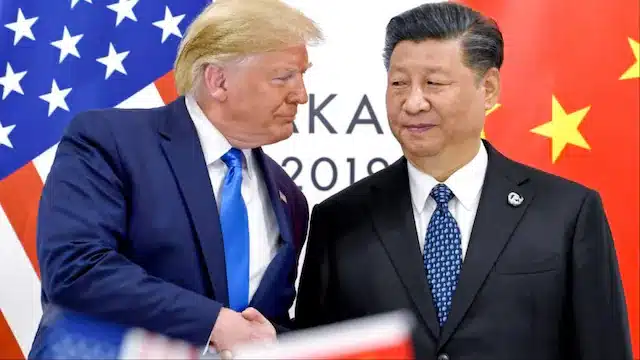Trump Unveils New Trade Agreement Between the U.S. and Vietnam

President Donald Trump announced on Wednesday that the United States will impose a 20% tariff on imports from Vietnam as part of a new trade agreement reached during urgent negotiations. This new tariff replaces a previously planned 46% levy that was set to take effect next week. The deal also stipulates that Vietnam will not charge tariffs on U.S. products, marking a significant shift in trade relations. As other countries, including the European Union and Japan, scramble to finalize their own agreements with the U.S., this development highlights the ongoing complexities of international trade.
Details of the Trade Agreement
Under the newly established trade agreement, Vietnam will eliminate tariffs on U.S. goods, allowing American products to enter the Vietnamese market without additional charges. President Trump emphasized this unprecedented access in a social media post, stating that Vietnam would “OPEN THEIR MARKET TO THE UNITED STATES.” This move is expected to benefit U.S. exporters, as they will have the opportunity to sell their products in Vietnam at zero tariffs. However, the agreement also includes a 40% tariff on goods that are trans-shipped through Vietnam, a measure aimed at curbing the practice of rerouting Chinese products through the country to avoid tariffs.
Peter Navarro, a senior trade advisor to Trump, noted that a significant portion of Vietnamese exports to the U.S. consists of Chinese goods. This has raised concerns about the effectiveness of the new tariffs in preventing trade circumvention. The implications of these tariffs could affect consumer prices in the U.S., as importers may choose to pass on the costs to consumers rather than absorbing them.
Reactions from Business Leaders
The announcement of the trade deal has elicited mixed reactions from business leaders and trade experts. Adam Sitkoff, the executive director of the American Chamber of Commerce in Hanoi, expressed optimism about the agreement, suggesting that it positions Vietnam favorably in the global market. He indicated that companies shipping from Vietnam to the U.S. are likely to continue their operations despite the new tariffs. However, Sitkoff raised concerns about the vagueness of the term “trans-shipping,” questioning how effectively Vietnamese authorities can monitor and enforce regulations against illegal rerouting of goods.
The initial response from the stock market was positive, with shares of companies manufacturing in Vietnam rising following the announcement. However, those gains were tempered once the specifics of the 20% tariff became clear. The uncertainty surrounding the enforcement of trans-shipping tariffs adds another layer of complexity for businesses navigating the new trade landscape.
Vietnam’s Growing Role in Global Manufacturing
Vietnam has emerged as a key player in global manufacturing, attracting major brands such as Nike, Apple, and Lululemon. The country has benefited from companies relocating their production facilities from China to avoid tariffs imposed during Trump’s first term. As a result, Vietnam has become a vital manufacturing hub, contributing significantly to its economy.
The recent trade agreement is expected to further solidify Vietnam’s position in the global supply chain. The country’s government has also been proactive in fostering relationships with U.S. businesses, as evidenced by a recent phone call between Trump and Vietnam’s General Secretary To Lam, during which an invitation for a presidential visit was extended. Additionally, the Trump Organization has announced plans for substantial investments in Vietnam, including a $1.5 billion project involving hotels, golf courses, and luxury real estate.
Future Trade Relations
The trade deal with Vietnam comes amid a broader context of U.S. trade negotiations with various countries. Since April, the Trump administration has sought to establish agreements with multiple trading partners, citing a need for reciprocity in trade practices. While a temporary reduction in retaliatory duties with China and a pact with Britain have been announced, many other countries are still in discussions with the U.S. to secure favorable trade terms.
As the global trade landscape continues to evolve, the implications of the new tariffs and agreements will be closely monitored by businesses and governments alike. The outcome of these negotiations will likely shape the future of international trade relations and economic partnerships for years to come.
Observer Voice is the one stop site for National, International news, Sports, Editor’s Choice, Art/culture contents, Quotes and much more. We also cover historical contents. Historical contents includes World History, Indian History, and what happened today. The website also covers Entertainment across the India and World.
Follow Us on Twitter, Instagram, Facebook, & LinkedIn

